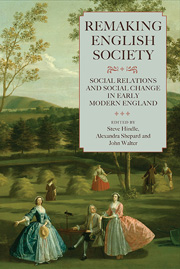Book contents
- Frontmatter
- Contents
- List of Illustrations, Figures, Maps and Tables
- Acknowledgements
- Notes on Contributors
- List of Abbreviations
- 1 The Making and Remaking of Early Modern English Social History
- 2 Brokering Fatherhood: Illegitimacy and Paternal Rights and Responsibilities in Early Modern England
- 3 Gender, Sexuality and the Consumption of Musical Culture in Eighteenth-Century London
- 4 Where was Mrs Turner? Governance and Gender in an Eighteenth-Century Village
- 5 Local Arithmetic: Information Cultures in Early Modern England
- 6 Intoxicants and the Early Modern City
- 7 Food, Drink and Social Distinction in Early Modern England
- 8 Written Obligations, Litigation and Neighbourliness, 1580–1680
- 9 Witchcraft and Neighbourliness in Early Modern England
- 10 Deference, Paternalism and Popular Memory in Early Modern England
- 11 Work, Reward and Labour Discipline in Late Seventeenth-Century England
- 12 Living in Poverty in Eighteenth-Century Terling
- 13 From Commonwealth to Public Opulence: The Redefinition of Wealth and Government in Early Modern Britain
- Appendix: Bibliography of the Published Writings of keith Wrightson from 1974 to 2011
- Index
- Tabula Gratulatoria
- STUDIES IN EARLY MODERN CULTURAL, POLITICAL AND SOCIAL HISTORY
10 - Deference, Paternalism and Popular Memory in Early Modern England
Published online by Cambridge University Press: 05 May 2013
- Frontmatter
- Contents
- List of Illustrations, Figures, Maps and Tables
- Acknowledgements
- Notes on Contributors
- List of Abbreviations
- 1 The Making and Remaking of Early Modern English Social History
- 2 Brokering Fatherhood: Illegitimacy and Paternal Rights and Responsibilities in Early Modern England
- 3 Gender, Sexuality and the Consumption of Musical Culture in Eighteenth-Century London
- 4 Where was Mrs Turner? Governance and Gender in an Eighteenth-Century Village
- 5 Local Arithmetic: Information Cultures in Early Modern England
- 6 Intoxicants and the Early Modern City
- 7 Food, Drink and Social Distinction in Early Modern England
- 8 Written Obligations, Litigation and Neighbourliness, 1580–1680
- 9 Witchcraft and Neighbourliness in Early Modern England
- 10 Deference, Paternalism and Popular Memory in Early Modern England
- 11 Work, Reward and Labour Discipline in Late Seventeenth-Century England
- 12 Living in Poverty in Eighteenth-Century Terling
- 13 From Commonwealth to Public Opulence: The Redefinition of Wealth and Government in Early Modern Britain
- Appendix: Bibliography of the Published Writings of keith Wrightson from 1974 to 2011
- Index
- Tabula Gratulatoria
- STUDIES IN EARLY MODERN CULTURAL, POLITICAL AND SOCIAL HISTORY
Summary
The poetry of John Clare, the most articulate voice of the rural working class of early nineteenth-century England, can be read as a meditation upon the relationship between memory and social relations. Clare drew upon the local traditions with which he had been brought up, setting them as golden memories against the harshness of the social conditions of the time at which he was writing. Within Clare's vision of agrarian history, parliamentary enclosure had fractured a distinct set of social relations, one characterised by paternalism, decency and kindness. In The Shepherd's Calendar, Clare conjures up a lost world of social harmony, when masters drank and socialised with their workers. Clare shows us an old farm labourer working with his younger workmates:
… in some threshing floor
There they wi scraps of songs & laugh and [t]ale
Lighten their an[n]ual toils while merry ale
Goes round & gladdens old mens hearts to praise
The thread bare customs of old farmers days
Who while the sturting sheep wi trembling fears
Lies neath the snipping of his harmless sheers
Recalls full many a thing by bards unsung
& pride forgot – that reign[e]d when he was young
The last two generations of early modern social historians have demonstrated that, whatever else they were, English villages before large-scale parliamentary enclosure were not rural idylls; yet Clare's poetry routinely presents them as such. If the task of the historian lies in the search for unmediated, objective truth, then Clare's work might easily be dismissed as nostalgic retrospection.
- Type
- Chapter
- Information
- Remaking English SocietySocial Relations and Social Change in Early Modern England, pp. 233 - 254Publisher: Boydell & BrewerPrint publication year: 2013

